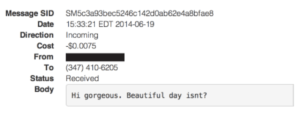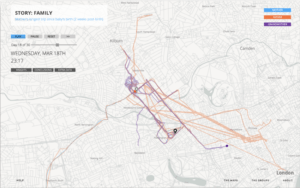Mimi Ọnụọha is a Nigerian-American artist and researcher that focuses on the implications of data collection. She graduated from NYU Tisch’s Interactive Telecommunications Program with a Master of Professional Studies (MPS) in 2013. She is mostly interested in creative interrogations and the idea of data collection, specifically how data was rendering people’s worlds and ideas of themselves. One of her well-known projects is *69, which is a piece that was created to fight back against catcalling. One summer when she was living in Brooklyn, she would get catcalled and begin to think about the reasons behind catcalling and whether it was her fault which inspired her to start this project. She made a phone number and using Twillio, an American cloud communications platform, she connected the phone number to a server so that whenever someone would call the number it would not work since the voice box was full so they would have to text it. Whenever someone would catcall her she would give them a piece of paper with a phone number on it. If a catcaller did indeed message her (first image), they would get one of a series/stream of messages that Mimi programmed such as the one in the second image. Sometimes, the catcaller would feel bad (such as in the third image) while others would just cuss at her.


 The numbers would then be saved to a database. Mimi was giving the papers throughout the summer and realized that she was creating a ‘catcaller database’. Mimi then worked on another project she called Pathways which showcased people’s subjectivity around the collection. She collected one month’s worth of data from four groups – 3 coworkers, roommates, a family, and a couple. Using the data, she was able to investigate and study ordinary people through their personal data. For instance, in the image below which showcases the data of the family, one can see that the mother did not travel a lot which was obvious since she was pregnant. Moreover, when the mother gave birth a lot of the family members were usually in the same area and Mimi was able to figure that out only using the data.
The numbers would then be saved to a database. Mimi was giving the papers throughout the summer and realized that she was creating a ‘catcaller database’. Mimi then worked on another project she called Pathways which showcased people’s subjectivity around the collection. She collected one month’s worth of data from four groups – 3 coworkers, roommates, a family, and a couple. Using the data, she was able to investigate and study ordinary people through their personal data. For instance, in the image below which showcases the data of the family, one can see that the mother did not travel a lot which was obvious since she was pregnant. Moreover, when the mother gave birth a lot of the family members were usually in the same area and Mimi was able to figure that out only using the data.
 Projects like these taught Mimi important lessons such as the importance of considering the collection process, and that if you haven’t considered the collection process you aren’t really considering the data. She also talks about how those with resources lack incentives and that collection takes more than it gives. This inspired her to make The Library of Missing Data Sets which is a mixed-media installation that showcases things excluded from society. Using this project and working with other small groups to work on different articles such as how people of color weren’t represented on Broadway (since there were no datasets that proved that this was true). She was able to see how small groups can collect data and make an impact. It also showed how people are better than machines when it comes to figuring out what isn’t being collected. One major issue in society is when it comes to selection and who chooses what is being collected and how information can also be manipulated. This is why it is exceedingly important to dig underneath the surface and try to think outside of the box. People like Mimi just show the importance of under-represented datasets and how they can be used to impact society positively.
Projects like these taught Mimi important lessons such as the importance of considering the collection process, and that if you haven’t considered the collection process you aren’t really considering the data. She also talks about how those with resources lack incentives and that collection takes more than it gives. This inspired her to make The Library of Missing Data Sets which is a mixed-media installation that showcases things excluded from society. Using this project and working with other small groups to work on different articles such as how people of color weren’t represented on Broadway (since there were no datasets that proved that this was true). She was able to see how small groups can collect data and make an impact. It also showed how people are better than machines when it comes to figuring out what isn’t being collected. One major issue in society is when it comes to selection and who chooses what is being collected and how information can also be manipulated. This is why it is exceedingly important to dig underneath the surface and try to think outside of the box. People like Mimi just show the importance of under-represented datasets and how they can be used to impact society positively.